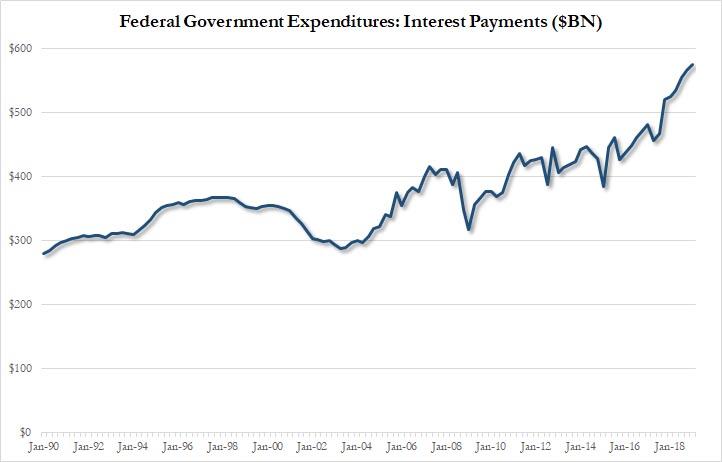Another month, another frightening jump in the US budget deficit.
According to the latest Treasury data, the US budget surplus in January - traditionally one of the few surplus months of the year due to its tax receipts timing - was only $9 billion, badly missing the $25 billion surplus expected, and far below the $49 billion surplus recorded last January; it was the smallest January gain since 2015.
As a result, the budget deficit for the first four months of the fiscal year, widened to $310 billion, a whopping 77% higher than the $175.7 billion reported for the same period last year, largely the result of the revenue hit from Trump's tax cuts and the increase in government spending. The deficit was the result of a 2% drop in fiscal YTD receipts to $1.1 trillion, while spending jumped 9% to $1.4 trillion.
Finally, and perhaps most concerning, is that for the first four months of this fiscal year, interest payments on the U.S. national debt hit $192 billion, $17 billion, or 10% more than in the same four-month period last year and the most interest ever paid in the first third of the fiscal year. As Reuters' Jeoff Hall points out, annualizing the $192BN interest expense means that the interest on U.S. public debt is on track to reach a record $575 billion this fiscal year, more than the entire budget deficit in FY 2014 ($483 BN) or FY 2015 ($439 BN), and equates to 2.7% of estimated GDP, the highest percentage since 2011.

And since total debt, which recently surpassed $22 trillion is only set to keep rising - once the latest pesky debt ceiling issue is resolved in a few months - expect interest on the debt to keep rising, especially if the Fed reverts to its tightening trajectory, and hit $1 trillion per year in a few years, making it one of the biggest spending categories, and on pace to surpass total US defense spending (roughly $950BN per year) in dollar terms in just a few years.
0 comments:
Post a Comment